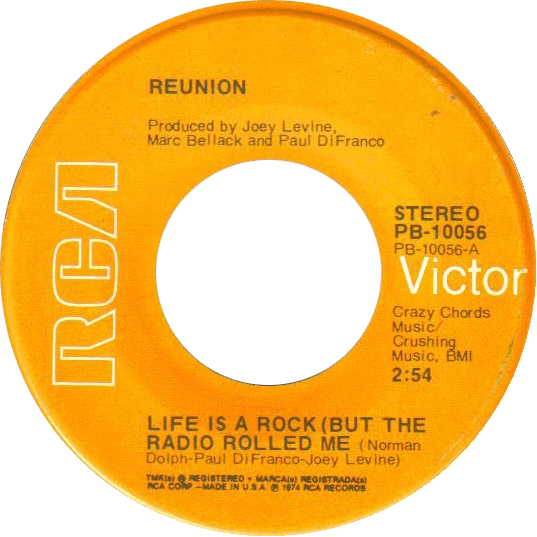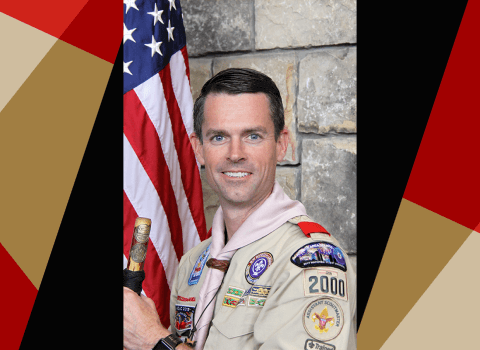Paul DiFranco’s path to Shenandoah University began – appropriately, for a distinguished adjunct professor of Music Production & Recording Technology (MPRT) – with a song.
This one, by the band Reunion – “Life Is a Rock (But the Radio Rolled Me)”:
He produced and co-wrote the song, which reached number eight on the Billboard Hot 100 chart in 1974. More than a decade later, he and the song’s other writers sued a major fast-food company for copyright infringement. While the writers and the company settled out of court, and DiFranco had long understood the importance of copyright (he had always copyrighted his material), the experience exposed him to the best minds in the business when it came to copyright law.
John Clarke, his attorney, handed him a book by William Krasilovsky, “This Business of Music,” which DiFranco said proved to be invaluable to him in the career on which he embarked at around the same of the suit, and which ultimately brought him to Shenandoah: music supervision.
It’s a career he maintains as he teaches “Copyright and Music Supervision,” a course required for MPRT students, as well as introductory and directed study courses for the College of Arts & Sciences/Shenandoah Conservatory joint minor in film studies. He’s currently doing all the music licensing for the BET cable network’s show, “The Quad,” and is music supervisor on Universal Studios’ “Bring It On: All-Stars,” — his fourth “Bring It On” film.
DiFranco, who arrived at Shenandoah in 2011, began his career in music by playing in bands in the Bronx, writing music, and plugging songs for use on television programs. He was a record producer for labels like Columbia and RCA and built several recording studios, including Soho Sound, which he built, owned and operated. His music career meshed with film when his brother, who authored a book about the films of B-movie king Roger Corman, introduced DiFranco to the filmmaker.
DiFranco said he asked Corman about the music in his films, and when Corman responded that it cost him money, DiFranco responded that music would make him money, through the broadcast royalties paid to the music’s owners, which, in this case, was Corman’s company. DiFranco soon started working for Corman as his worldwide vice president of music. He spent 11 years with Corman’s Concorde Pictures, where he also created and ran Corman’s record company, Cinemadisc Records. While with Corman, he mentored Alexandra Patsavas, who went on to be the music supervisor for “Mad Men” and the “Twilight” film series. “I learned so much from the first music supervisor I worked for, Paul DiFranco,” Patsavas told American Songwriter magazine in 2012. “He was an incredibly generous boss.”
During his long career, DiFranco also worked for Miles Copeland (founder of IRS Records), creating a music department for IRS Media Films, which he ran for six years. Additionally, he served as post-production and music supervisor, as well as voice casting director, for cartoon shows like “Digimon” for Fox Family Channel (now ABC family).
He went into the Fox Family job without any experience in voice casting, but when asked to give it a try, he gave the answer that he said is always the rule in Hollywood: “Yes.”
Since the early 2000s, DiFranco has also been a music supervisor for Universal Studios, Sony Pictures, and Queen Latifah’s Flavor Unit, and has worked on films like “Wes Craven’s New Nightmare,” “Highlander: The Final Dimension,” “Soul Surfer,” a couple of the “American Pie” films and “The Little Rascals.” As a music supervisor and producer, he’s worked on more than 300 feature films and 200 television episodes.
He’s a full-service music supervisor, who can handle the first cut of composer candidates for a film, finds music to fit a film, writes and negotiates music contracts for a film, and secures needed music licenses. For him, a film’s budget drives his decisions. His first question on a project is always, “What’s the budget?” There’s a simple reason for that. “On-screen music is the most expensive music there is,” he said. DiFranco loves finding a song just before it hits big, and acquiring the rights to use it before fees rise sharply, as he did with Lady Gaga’s “Just Dance,” which he secured for one of his films just four days before the song was released and turned into a major hit.

In his role with the film program, he also teaches screenwriting, which is a new experience for him, although he had sold several stories for film. However, when he was asked to teach the class, he answered his old Hollywood answer: “Yes,” because he’s broken down scripts for years to pair them with music and has a thorough understanding of script mechanics.
“His work in the screenwriting class has opened up potential partnerships with professional studios, including an offer of distribution, which is nearly unheard of,” said Director of Acting and Associate Professor of Theatre J.J. Ruscella, who tapped DiFranco for the course. “Throughout the semester, the students were not only guided by his understanding of story and the industry formatting, which he understood implicitly, but they also benefited from access to industry professionals who Skyped directly into the class.”
DiFranco said he brings in professionals who not only explain what they do, but also, how they got to where they are today. “There’s no one way to do this, in entertainment,” he said.
Of course, his experience also informs his MPRT program instruction. For his music supervision course, he, in essence, continues his work. “I just bring those kids into my process when I’m working on a show.”
He’s had a long and rich career in a field he loves, and he’s delighted to continue expanding it by teaching at Shenandoah. “There’s so much talent here, it’s ridiculous,” he said, smiling, as he complimented the efforts of both his film and MPRT students. His goal is to provide them with both the practical skills they’ll need when they enter the music or film business and a spirit of adventure – that ability to say “yes,” whenever an opportunity comes calling.
“I couldn’t think of better work,” he said.






